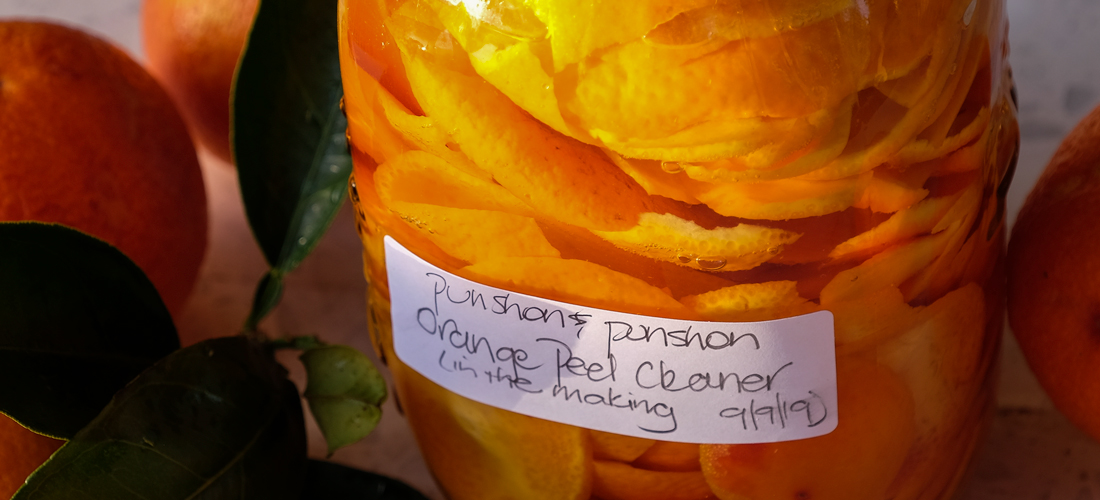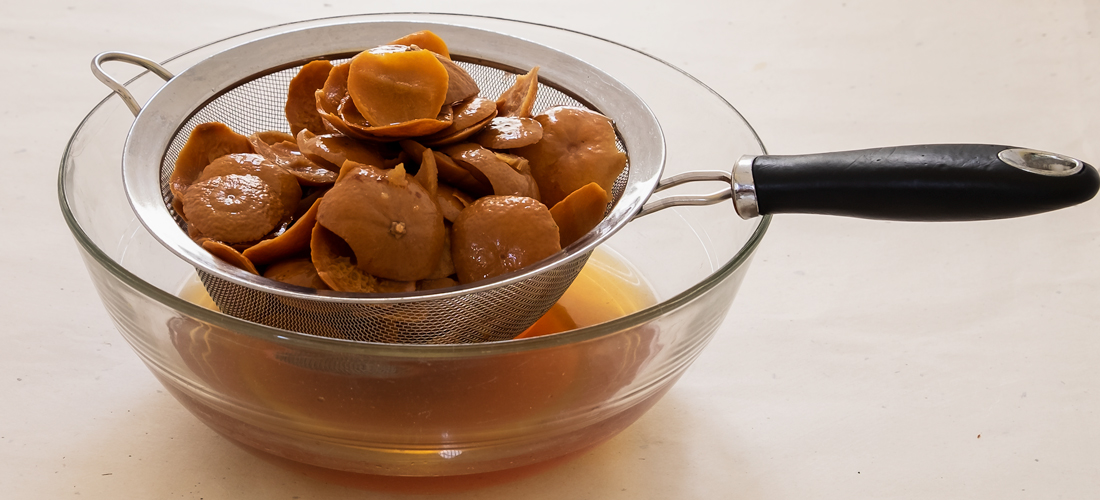Orange Peel Cleaner
- Sustainable Kitchen

Reduce your kitchen waste by transforming unwanted orange peel, into a inexpensive, effective, and safe household cleaner. Instead of discarding those peels this simple no-fuss process will reduce your cleaning product costs, plastic waste and use of environmentally harmful cleaning products. Orange peel contains d-limonene, a naturally occurring compound that produces that distinctive citrus smell. Acting also as a natural solvent, when it teams up with vinegar, it’s the perfect cleaner and deodoriser.
It’s time to ditch those commercial products and turn your kitchen waste into a reusable resource. When oranges are abundant have multiple jars steeping in the pantry. Store the final concentrate in funky bottles to make a perfect thank-you gift.
- Preparation Time:
- 15 minutes + 8 weeks steeping
INGREDIENTS
- To fill jar
- Orange peel
- To cover the peel
- White vinegar
METHOD
Place orange peels in a medium-large wide rimmed screw top or clip-down jar.
Cover completely with white vinegar. Swirl the jar so the peels curve around in it.
Place in pantry or cool place for 2-3 days then check the peel is completely covered by vinegar. Top-up if necessary.
Secure tightly. Label with the date when it’s to be strained.
Allow to steep for 6-8 weeks. The longer the vinegar and peel can infuse, the more oil and orange colour will be extracted. If there’s room in the jar, keep adding to it.
After 6-8 weeks, strain off the peels and discard. The orange peel vinegar will be a cadmium orange colour and have an intense citrus fragrance.
Pour into a storage bottle, preferably with a plastic, cork, glass or plastic lined metal lids. Label clearly as a cleaning product. Store in a safe location.
To use, mix 1 part orange peel vinegar to 1 part water and place in a spray bottle.
Use as a cleaner and to deodorise. It’s not recommended to use on sealed wooden floors, granite, quartz or marble counter tops or any other surfaces where vinegar (acetic acid) will react with the surface or remove the sealant. If you’re unsure, check the manufacturers specifications. Some may recommend testing in an inconspicuous spot. If you use this method, it's important to note the affect of acetic acid can build up over time and cause damage.
To remove hard water stains in the bathroom use at full strength.
NOTES
- Keep the peel completely covered with vinegar otherwise the essential oil and fragrance from any uncovered peel, cannot infuse into the vinegar.
- The orange peel cleaner can be used earlier; however, it will not have the same concentration of natural oil and fragrance.
- The mixture will become darker and the peels will begin to discolour over time. The longer the peel and vinegar infuses the greater the transfer of oil and fragrance.
- Commercial vinegar will have 4-5% acetic acid. If you use home made vinegar and the acetic acid percentage is unknown, the cleaner may not be strong enough to disinfect.
- Clearly label as a household cleaner as its translucent cadmium orange colour will look very appealing and could be mistakenly consumed.
- The cleaner will last for at least 12 months, however the colour will deteriorate over time.
- If vinegar remains in contact with metal lids, it will rust over time. Select bottles that have plastic, cork, glass, or plastic lined metal lids.

Strained peel after steeping period in vinegar
